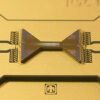A new study by researchers at NYU Abu Dhabi examined data representing thousands of mentor-protégé relationships and found that mentorship quality predicted the scientific impact of the papers written by protégés—without their mentors—after their mentorship. Significantly, the researchers also found that increasing the proportion of female mentors was associated not only with a reduction in post-mentorship impact of female protégés, but also a reduction in the gain of female mentors.
Assistant Professor of Computational Social Science Bedoor Al Shebli, Assistant Professor of Social Research and Public Policy Kinga Makovi, and Associate Professor of Computer Science Talal Rahwan report their new findings in The Association between Early Career Informal Mentorship in Academic Collaborations and Junior Author Performance, published in Nature Communication. They identified and studied mentorship in the form of scientific collaborations in more than 300 million research publications. Looking at the career timelines of scientists through their publications, they were able to identify junior and senior scientists working together on a given research paper. In these collaborations, they identified a “protégé” and all of her or his mentors, i.e., senior scientists in the institution where they authored a given publication, who were scholars in the same discipline, and the researchers’ academic age.
“What makes this study of mentorship different to other previous studies is that we didn’t look at mentorship in the formal sense of a student and his or her advisor,” said Al Shebli. “Instead, we acknowledge that mentorship as a whole can come from multiple seniors throughout a junior scientist’s early career years, and a mentor does not necessarily have to take on a formal advisory role to fulfill such a role.”
The research team identified three million protégé-mentor pairs and surveyed a random sample of the protégés to verify that they view their senior co-authors as mentors in their career years. They then quantified mentorship quality using two measures: the “big-shot experience,” which measures how successful the mentor was at the time of their collaboration through the average number of citations they accumulated by the beginning of the mentorship period, and the “hub experience,” which measures how connected a mentor was by looking at her or his network of collaborators by the beginning of the mentorship period.
Al Shebli added, “While current diversity policies encourage same-gender mentorships to retain women in academia, our findings raise the possibility that opposite-gender mentorship may actually increase the impact of women who end up pursuing a scientific career. Our findings add a new perspective to the policy debate on how to best elevate the status of women in science.”
Sharing of tacit knowledge is most important aspect of mentorship, study finds
More information:
Bedoor AlShebli et al. The association between early career informal mentorship in academic collaborations and junior author performance, Nature Communications (2020). DOI: 10.1038/s41467-020-19723-8
Provided by
New York University
Citation:
Study finds opposite-gender mentorships may be more beneficial to female researchers (2020, November 18)
retrieved 18 November 2020
from https://phys.org/news/2020-11-opposite-gender-mentorships-beneficial-female.html
This document is subject to copyright. Apart from any fair dealing for the purpose of private study or research, no
part may be reproduced without the written permission. The content is provided for information purposes only.



